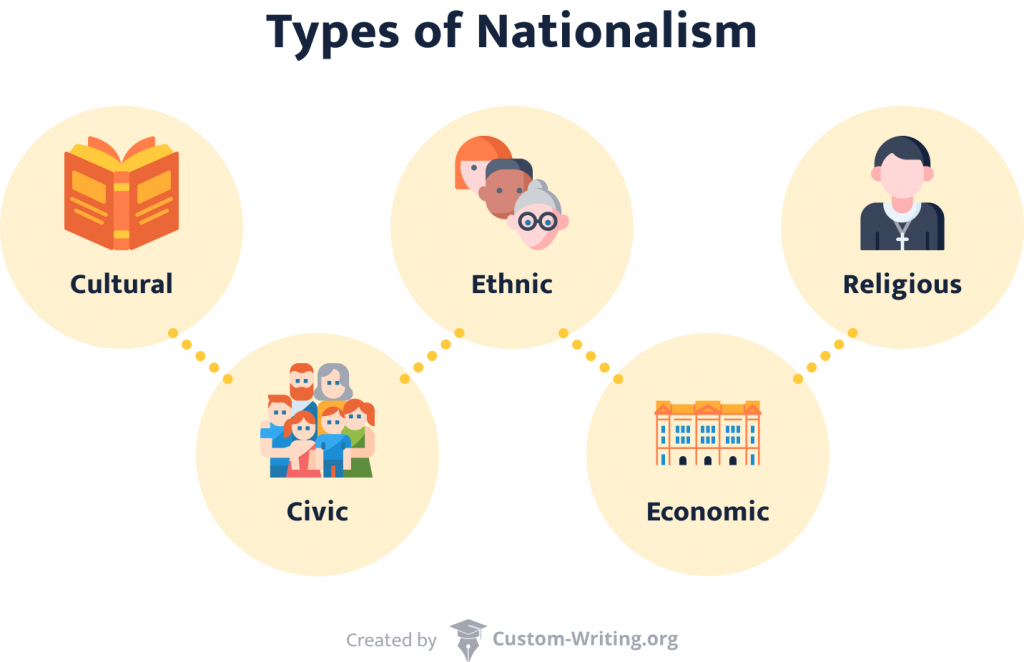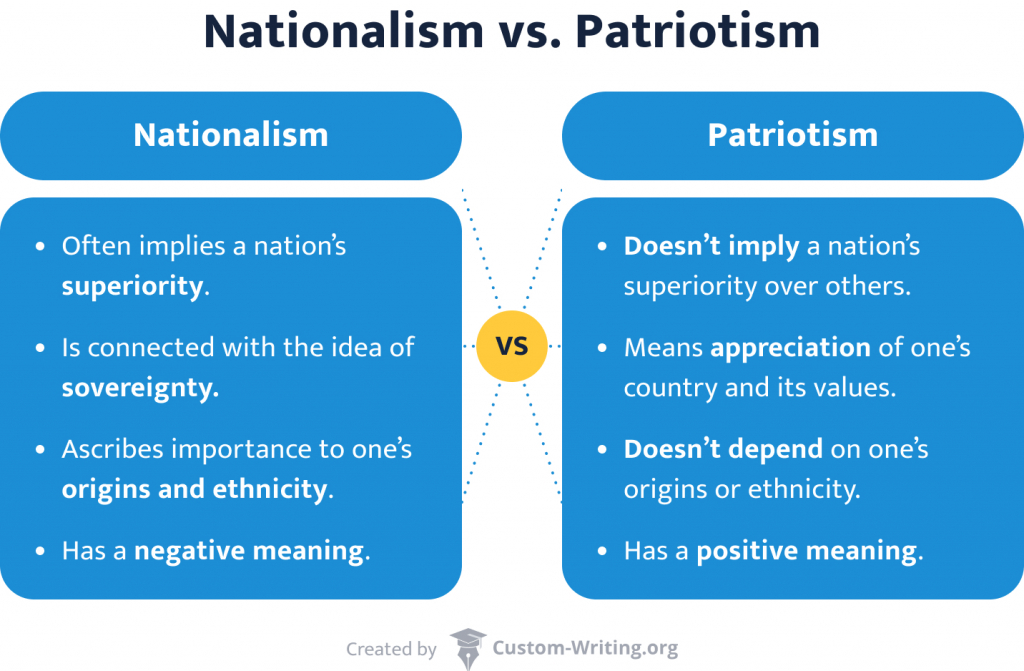In a simple definition, nationalism is a belief or ideology centered around devotion and pride in one’s nation. It often emphasizes the importance of a shared culture and history as well as unity among people. If you are writing an essay about nationalism, you can concentrate on its various forms or positive and negative impacts it might have according to application.
This article by our Custom-Writing experts contains:
- Definitions and comparisons of different types of nationalism;
- A step-by-step nationalism essay writing guide;
- A number of nationalism examples;
- A list of 44 nationalism essay topics.
🔝 Top 10 Nationalism Essay Topics
- Irish nationalism in literature
- Cultural nationalism in India
- Can nationalism promote peace?
- The politics of contested nationalism
- How does religion influence nationalism?
- Does globalization diminish nationalism?
- Does nationalism promote imperialism?
- Nationalism in the Israeli-Palestinian Conflict
- How liberalism leads to economic nationalism
- Link between national identity and civic nationalism
❓ Nationalism Essay: What Is It About?
Nationalism is an idea that a nation’s interests are above those of other countries or individuals. It implies identifying with a nation and promoting its independence. In particular, nationalism ascribes value to a nation’s culture, traditions, religion, language, and territory.
In fact, “nationalism” is a very complicated term. It has many types and gradations that are exciting to explore. Besides, it has a long and varied history. In countries such as India and France nationalism helped to achieve democracy and independence. At the same time, in it extreme forms it led to wars and terrorism. Any of these aspects can be the focus of your nationalism essay.
How to Write about Nationalism?
Nationalism is a complex phenomenon. It has positive and negative sides. Because of this, it’s crucial to write about it objectively. In any academic text on nationalism, you should provide relevant arguments, quotes, and other evidence.
Types of Nationalism
As we’ve mentioned before, nationalism is a complicated notion. It varies a lot from country to country as well as historically. That’s why scholars proposed a classification of nationalism types. It helps to reflect these differences. Check out some of the most popular forms of nationalism in the list below.

- Cultural nationalism. This type is centered on a nation’s culture and language. In the 1800s, it became a popular idea in Europe and postcolonial states. Cultural nationalism is reflected in the celebration of folklore and local dialects. For example, in Ireland it led to an increased interest in the Gaelic language. We can still find ideas related to this ideology today. A prominent example is Americans’ appreciation of their cultural symbols, such as the flag.
- Civic nationalism. Civic nationalism’s definition is an idea of belonging through common rights. According to this ideology, the interests of a state are more important than those of a single nation. Civic nationalism is based on modern ideas of equality and personal freedom. These values help people achieve common goals. Nowadays, civic nationalism is closely associated with liberal Western countries.
- Ethnic nationalism. This type is focused on common ethnicity and ancestry. According to ethno-nationalists, a country’s homogenous culture allows sovereignty. This ideology is considered controversial due to its association with racism and xenophobia. Ethnic nationalism’s pros and cons can be illustrated by its effects on culture in Germany. On the one hand, it influenced the art of the Romantic era. On the other, its extreme form led to the rise of Nazism.
- Economic nationalism. A simple definition of economic nationalism is the idea that a government should protect its economy from outside influences. It leads to the discouragement of cooperation between countries. Such an approach has its benefits. However, it is often counterproductive. Scholars point out many failures throughout the history of economic nationalism. The Great Depression, for example, was prolonged due to this approach.
- Religious nationalism. The fusion of politics and religion characterizes this ideology. Its proponents argue that religion is an integral part of a national identity. For instance, it helps to unite people. The rise of religious nationalism often occurs in countries that fight for independence. Notable examples are India, Pakistan, and Christian countries like Poland.
The Globalism vs Nationalism Debate
One of the fiercest debates concerning nationalism is focused on how it relates to globalism. These two attitudes are often seen as opposed to each other. Some even call globalism and nationalism “the new political divide.” Let’s see whether this point of view is justified.
Nowadays, communities around the world are becoming more and more homogenous. This unification and interconnectedness is called globalization, while an ideology focused on its promotion is known as globalism.
Naturally, these tendencies have their pros and cons. Want to learn more? Have a look at the table below.
As you can see, both notions have their strong and weak aspects. But can globalism and nationalism coexist? In fact, many scholars say “yes, they can.” Instead of choosing either option, people can combine their best traits. This way, we will promote effective communication and collaboration.
Nationalism vs. Patriotism
You may be wondering: Is nationalism a synonym for patriotism? The answer is that both words denote pride and love for one’s country. However, there is an important distinction to be made. While patriotism has a generally positive meaning, nationalism has a negative one.

The main difference lies in the attitude towards other nations:
- Patriotism doesn’t imply that one’s nation is superior to others. Generally, this term refers to how the state approaches its ideals, values, and culture. In this case, a patriot of a particular country can represent any nation, regardless of their origin.
- In contrast, nationalism implies an idea of a nation’s sovereignty. This means that a country’s interests are viewed separately from the rest of the world. It also focuses on the importance of nation’s culture and ethnicity. In extreme situations, these values may result in an idea of supremacy.
In short, nationalism is patriotism taken to the extreme. With this in mind, let’s have a look at positive and negative effects of nationalism. An essay on any of the following points will surely be a success.
✔️ Nationalism Pros and Cons
If you have to write an essay on “why nationalism is good”, here are some of its key benefits for you to consider:
But what about the concept’s drawbacks? After all, nothing can be 100% beneficial. For a credible investigation, it’s necessary to examine both sides of the topic. Here are some disadvantages to consider for a paper on nationalism:
As you can see, nationalism can lead both to prosperity and destruction. Now you know why keeping the balance is crucial to a nation’s well-being. Think about it when you write your argumentative essay on nationalism.
📜 Nationalism Essay Structure
Now, let’s take a closer look at the essay structure. When writing your paper on nationalism, follow this outline:
So, was the writing process as hard as you expected? Nationalism essays indeed require a little bit more time and research than other papers. Nonetheless, you can only benefit from this experience.
🌐 Nationalism Essay Topics
Don’t know which nationalism essay topic to choose? Try one of the ideas below:
- How do nationalism and patriotism differ? The former is linked to acquiring territories perceived as the homeland. The latter means taking pride in the nation’s achievements. Scholars sometimes consider patriotism a form of nationalism.
- How does nationalism affect the distribution of the Sars-CoV-2 vaccine? Determine whether the countries with nationalist tendencies are more successful in getting their population vaccinated.
- Nationality politics in the Soviet Union. Under the rule of Stalin, the USSR transformed into a totalitarian state. But before that, Lenin took care to enact extensive ethnicity laws. What happened when Stalin slammed the brakes on the program?
- Perceiving nationalism as bad: why is it common? For many, the word itself evokes negative associations. For a person who considers themselves a liberal, it may seem like a great evil. Where does this perception come from? What benefits does nationalism have for liberals?
- Nationalist ideology and its many categories. In nationalism studies, the main distinction is between its ethnic and civic types. But there are many other categories that you can explore. Use this prompt to give an overview of such concepts.
- Religious nationalism: Crusades vs. Jihad. In the Middle Ages, Christians tried to stop Islam’s expansion via bloody crusades. In modern times, the call to jihad is used to mobilize extremist Muslims. What are the major differences between these types of holy war?
- What role does nationalism play in the Israeli-Palestinian conflict Israel and Palestine have been fighting for decades over what they believe to be a holy land. The dispute appears to be unsolvable. What arguments do both parties bring forth? How does Arab nationalism come into play here?
- The development of nationalism over time. The French Revolution was the result of nationalist thinking. However, what we perceive as nationalist today is different from what it was back then. In your essay, trace the origins and evolution of the term “nationalism” and its meaning.
- Prominent dictators then and now: a comparison. Hitler, Mussolini, and Franco are well-known names. But how do they compare to modern authoritarian leaders? When answering this question, evaluate the role of nationalist ideology.
- What are some political disadvantages of nationalism? Populist leaders are often unpopular with other politicians. Some examples are Poland’s PiS party and Donald Trump. Discuss how a nationalist stance can affect domestic policies.
- Arab nationalism and its influence on the world economy.
- Nationalism vs. liberalism.
- German nationalism and the World Wars.
- Economic nationalism: pros and cons.
- European nationalism in the 20th century.
- Globalism vs. nationalism: how do they differ?
- Jewish nationalism and its influence on the formation of the Israeli state.
- Relationship between nationalism and religion.
- Nationalism in Orwell’s novels.
- The French Revolution: how nationalism influenced the political system change.
- Is nationalism objectively good or bad?
- Nationalism, transnationalism, and globalism: differences and similarities.
- Russian nationalism in the 21st century and its impact on the world political system.
- Nationalism as a catalyst for war.
- Liberal nationalism and radical nationalism: benefits and disadvantages.
- Evaluate the significance of national identity.
- What is the difference between race and ethnicity?
- How can love of a country positively impact a state’s healthcare system?
- What fueled the rise of nationalism in the post-socialist space?
- Trace the connection between nationalist ideology and morality.
- What countries are considered nationalizing?
- Compare the conflicts where nationalism hinders solution.
- Choose five aspects of neo-nationalism and analyze them.
- Nationalist expressions in art.
- Nationalism in Ukraine: consequences of the Crimean annexation.
- Revolution and nationalism in South America.
- Examine the significance of street names to spread nationalist views.
- Why do people grow attached to a specific territory?
- The political power of nationalist language and propaganda.
- What does the feminist theory say about chauvinism?
- What makes post-colonial nationalism unique?
- Assess the difference between Western and non‐Western nationalism.
- Sex and gender in nationalism.
- Civic and ethnic forms of nationalism: similarities and differences.
📝 Nationalism Examples & Essay Prompts
Want more ideas? Check out these additional essay prompts on some of the crucial nationalism topics!
Nationalism in South Africa Essay Prompt
South African nationalism is a movement aimed at uniting indigenous African peoples and protecting their values. An essay on this topic can consist of the following parts:
- The factors that led to the rise of African nationalism. These include dissatisfaction with colonial oppression, racial discrimination, and poor living conditions.
- Effects of African nationalism. One significant achievement is indigenous peoples regaining their territories. They also improved their status and revived their culture that was distorted by colonialism.
- Conclusion of African nationalism. With time, the struggle for autonomy evolved into an idea of Pan Africanism. This concept refers to the unification of indigenous South African peoples.
Nationalism in India Essay Prompt
Nationalism in 19th-century India was a reaction against British rule. One of its defining characteristics is the use of non-violent protests. Your essay on this topic may cover the following aspects:
- Mahatma Gandhi and Indian nationalism. Gandhi was a pioneer of non-violent civil disobedience acts. His adherence to equality inspired many human rights activists.
- Cultural nationalism in India. Pride rooted in national heritage, language, and religion played a crucial role in Indian nationalism. One of the most important figures associated with this movement is Bengal poet Rabindranath Tagore.
Nationalism in the Philippines Essay Prompt
Nationalism in the Philippines has a unique chronological pattern. It’s also closely related to the Philippino identity. You can explore these and other aspects in your essay:
- The rise of Filipino nationalism in the 19th century. Discuss the role of José Rizal and the Propaganda Movement in these events.
- Nationalism and patriotism in the Philippines. Compare the levels of patriotism at different points in the country’s history.
- Is there a lack of nationalism in the Philippines? Studies show that Filipinos have a relatively weak sense of nationhood and patriotism. What is your perspective on this problem?
How Did Nationalism Lead to WWI?: Essay Prompt
Nationalism is widely considered to be one of the leading causes of WWI. Discuss it with the following prompts:
- Militarism and nationalism before WWI. Militarism is a belief in a country’s military superiority. Assess its role in countries such as the British and Russian Empires before the war.
- How did imperialism contribute to WWI? Imperialism refers to a nation’s fight for new territories. It fuelled the rivalry between the world’s leading countries before the war.
- Nationalism in the Balkans and the outbreak of WWI. Write a persuasive essay on the role of the Balkan crisis in Franz Ferdinand’s assassination. How did this event lead to the outbreak of war?
Want to see what a paper on this topic may look like? Check out this nationalism essay example:
Example:
Now you have all you need to write an excellent essay on nationalism. Liked this article? Let us know in the comment section below!
You might also be interested in:
- Canadian Identity Essay: Essay Topics and Writing Guide
- Human Trafficking Essay for College: Topics and Examples
- Essay on Corruption: How to Stop It. Quick Guide
- Murder Essay: Top 3 Killing Ideas to Complete your Essay
- Student Exchange Program (Flex) Essay Topics
- Gun Control Essay: How-to Guide + 150 Argumentative Topics
- Transportation Essay: Writing Tips and 85 Brilliant Topics
🔗 References
- A New Dawn in Nationalism Studies? European History Quaterly
- The SAGE Handbook of Nations and Nationalism: Google Books
- Nationalism Studies Program: 2-year MA Student Handbook (CEU)
- Nationalism: Stanford Encyclopedia of Philosophy
- Nationalism is back: The Economist
- Working-class Neo-Nationalism in Postsocialist Cluj, Romania: Academia
- Nationalism: Encyclopedia Britannica
- Nationalism: Definition, Examples, and History: The Balance
- The Problem of Nationalism: The Heritage Foundation
- Effects of Nationalism: LearnAlberta
- The Difference Between Patriotism and Nationalism: Merriam-Webster
- Varieties of American Popular Nationalism: Harvard University
- Not So Civic: Is There a Difference between Ethnic and Civic Nationalism?: Annual Review
- Globalism and Nationalism: Which One Is Bad?: Taylor & Francis Online
- African Nationalism and the Struggle for Freedom: Pearson Higher Education
![331 Advantages and Disadvantages Essay Topics [2026 Update]](https://custom-writing.org/blog/wp-content/uploads/2020/12/smiling-young-woman-284x153.jpg)

![533 Science and Technology Essay Topics to Write About [2026]](https://custom-writing.org/blog/wp-content/uploads/2021/01/scientist-working-in-science-and-chemical-for-health-e1565366539163-284x153.png)
![256 Satirical Essay Topics & Satire Essay Examples [2026]](https://custom-writing.org/blog/wp-content/uploads/2021/01/classmates-learning-and-joking-at-school-e1565370536154-284x153.jpg)
![287 Music Essay Topics + Writing Guide [2026 Update]](https://custom-writing.org/blog/wp-content/uploads/2021/01/lady-is-playing-piano-284x153.jpg)







Hi. Can you please help me out in getting a simple topic to discuss/write for my final essay in my masters programme pertaining to nationalism. I’m new to this field of study and would want to enjoy reading and writing this final essay. Thanks in advance for your help.
Thanks to historians all over the world!
I have to write a 3000-word essay on the following topic: “Is it possible to imagine nationalism without the nation”? I find the readings difficult to understand and would greatly appreciate any help you could give me. Thank you. Noreen Devine
Hi Noreen,
We’d be happy to help you with this task. Don’t hesitate to place an order with our writing company. Our best writer will help you understand the readings and create a great paper.
To Whom it May Concern,
Thank you so much for your help. This morning I was reading your tips on how to write an essay about nationalism, and I find that it’s so helpful. I will contact you soon for help.
Regards,
Alphonse